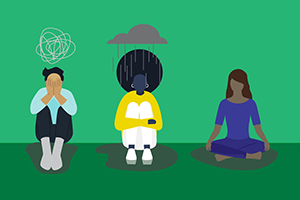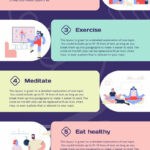It is often said that physical health and mental health are two sides of the same coin. This analogy suggests that one cannot be truly healthy without being healthy in both body and mind. While there is some truth to this, it is important to remember that physical and mental health are not always completely intertwined.
It is possible to have good physical health but poor mental health, or vice versa. However, it is also true that maintaining good physical health can help support good mental health, and vice versa. Therefore, while they are not always directly linked, taking care of both your physical and mental health is important for overall wellness.
There’s no denying that our physical health and mental health are interconnected. When we’re physically healthy, we tend to feel better mentally and vice versa. Unfortunately, there are times when our physical health can take a toll on our mental wellbeing (and vice versa).
For example, someone who is dealing with a chronic illness may find it difficult to cope with the day-to-day challenges of their condition. This can lead to feelings of depression, anxiety, and even isolation. Conversely, someone who is struggling with mental health issues may find it hard to take care of their physical health.
They may not have the energy or motivation to eat well, exercise, or even get out of bed some days.
It’s important to remember that we need to take care of both our physical and mental health in order to live happy and healthy lives. When one is suffering, the other is usually affected as well.
That’s why it’s so important to seek help when needed and create a support system of family and friends who can help us through tough times.
Physical and Mental Health
What is the Difference between Mental Health And Physical Health?
There is a big difference between mental and physical health. Mental health is all about our cognitive, emotional and behavioral well-being. It includes our ability to cope with stress, make decisions, solve problems and relate to others.
Physical health, on the other hand, is simply the state of being physically fit and healthy. It’s about having enough energy to get through the day, being able to fight off illness and injury, and having good organ function.
While it’s important to have both mental and physical health in order to live a happy and fulfilling life, they don’t always go hand-in-hand.
For example, you can be physically healthy but mentally unhealthy (e.g., if you’re coping with depression or anxiety). Alternatively, you can be mentally healthy but physically unhealthy (e.g., if you have an eating disorder or are addicted to drugs). And finally, you can be both mentally and physically unhealthy (e.g., if you have schizophrenia or are obese).
The bottom line is that mental and physical health are two separate but equally important aspects of our overall well-being. If we want to live our best lives possible, we need to take care of both our minds and our bodies!
Why is Physical Health Important for Mental Health?
There is a strong link between physical and mental health. When we are physically healthy, we tend to feel better mentally and emotionally. Conversely, when we are not feeling well physically, our mental health can suffer.
This is why it’s so important to take care of our physical health – it directly impacts our mental wellbeing.
Physical activity releases endorphins which have mood-boosting effects. Exercise has also been shown to help with anxiety and depression.
It helps by distracting us from negative thoughts, giving us a sense of accomplishment, and improving our sleep quality. All of these things contribute to better mental health overall.
Furthermore, physical illness can lead to mental health problems.
For example, someone who is suffering from a chronic pain condition may also experience depression or anxiety. This is because the pain can be all-consuming and make it difficult to focus on anything else. The person may become isolated and withdrawn as a result of their condition.
In this way, physical health problems can worsen existing mental health issues or even trigger new ones.
It’s clear that taking care of our physical health is essential for maintaining good mental health.
What is Mental & Physical Health?
Mental and physical health are two important aspects of our overall well-being. They are interconnected and affect each other. Good mental health is essential for our physical health and vice versa.
Mental health is our emotional, psychological and social well-being. It includes our ability to cope with stress, work productively, make meaningful relationships and enjoy life. A key part of good mental health is having a positive outlook and being able to manage our emotions effectively.
When we have good mental health, we feel good about ourselves and are able to function in our daily lives.
Physical health is just as important for our overall well-being. It refers to the state of our bodies and includes bothour physical fitness leveland how well we take care of ourselves physically.
To be physically healthy, we need to exercise regularly, eat a balanced diet, get enough sleep and see our doctor for regular checkups. Taking care of our physical health helps us stay strong and independent as we age. It also reduces our risk for chronic diseases such as heart disease, stroke and diabetes.
The mind-body connection is real – when one suffers, so does the other. That’s why it’s so important to take care of both your mental AND physical health!
How is Mental Health And Physical Health Related?
It’s no secret that there is a strong link between physical and mental health. After all, the mind and body are interconnected, so it stands to reason that one can affect the other. For example, someone who is physically healthy is more likely to have a positive outlook on life and be able to better manage stressors than someone who is not physically healthy.
Likewise, someone with good mental health is more likely to take care of their physical health by eating right, exercising regularly, and avoiding risky behaviors.
The connection between physical and mental health goes both ways. That means that not only can physical health affect mental health, but vice versa.
Mental illness can take a toll on a person’s physical health in a number of ways. For instance, depression has been linked to an increased risk for heart disease, obesity, and diabetes. Anxiety disorders can also lead to problems like headaches, gastrointestinal issues, and sleep problems.
It’s important to remember that just because there is a link betweenphysical and mental health does not mean that one causes the other. Rather, it’s likely that both play a role in influencing each other. For example, someone who is genetically predisposed to anxiety may be more likely to develop the disorder if they experience chronic stressors in their life (such as financial troubles or relationship difficulties).
The reverse is also true; someone who leads a relatively stress-free life may be less likelyto develop an anxiety disorder even if they have the genetic predisposition for it.
Of course, this isn’t to say that genetics don’t play any role at all – they definitely do!

Credit: rogersbh.org
How Mental Health Affects Physical Health
It’s long been said that there’s a strong connection between our mind and body. Now, science is beginning to back up what we intuitively know: that our mental health can have a profound effect on our physical health.
For example, studies have shown that people who are depressed are more likely to develop heart disease.
One theory is that depression causes inflammation throughout the body, which can lead to cardiovascular problems. Depression has also been linked to an increased risk of developing type 2 diabetes.
Stress is another mental state that can take a toll on our physical wellbeing.
When we’re stressed, our bodies release the hormone cortisol. In small doses, cortisol can be helpful; it gives us the energy we need to get through a difficult situation. But when cortisol levels are chronically high, it can lead to weight gain, high blood pressure and other serious health problems.
The good news is that there are things we can do to protect our mental and physical health: exercise, eat a healthy diet, get enough sleep and make time for relaxation and hobbies we enjoy.
Difference between Physical Health And Mental Health
There is a big difference between physical health and mental health. Physical health is the state of being free from physical illness or injury. Mental health, on the other hand, is the state of being free from mental illness or emotional distress.
Physical health is important for our overall well-being. It allows us to live our lives without pain and suffering from physical illnesses. Mental health, on the other hand, is just as important.
It allows us to live our lives without anxiety, depression, or other mental disorders.
It’s important to remember that physical and mental health are not mutually exclusive. We can have both good physical health and good mental health at the same time.
However, it’s also possible to have poor physical health and poor mentalhealth at the same time. When this happens, it’s called “comorbidity” and it can be very difficult to manage both conditions simultaneously.
If you are struggling with both poor physical and mentalhealth, it’s important to seek help from a professional who can provide you with treatment for both conditions.
With proper treatment, you can improve your overall quality of life significantly!
Mental Health And Physical Health Go Hand in Hand
It’s no secret that our mental and physical health are interconnected. When we’re feeling mentally well, we’re more likely to take care of our bodies and vice versa. But what exactly is this connection between our mind and body?
There are a few ways that mental and physical health influence each other. First, let’s look at how our thoughts can impact our physical wellbeing. It’s been shown time and again that stress can lead to a whole host of physical problems, from headaches and stomach issues to heart disease and even cancer.
On the flip side, positive thinking has been linked with better immunity, faster healing times, and improved cardiovascular health.
Our emotions can also affect our physical health. For example, studies have found that people who experience chronic anger or anxiety are more prone to developing high blood pressure than those who don’t.
And it works both ways – people who have chronic illnesses like heart disease or diabetes are more likely to suffer from depression or anxiety as well.
Finally, there’s the link between behavior and physical health. People who engage in risky behaviors like smoking or excessive drinking are obviously putting their bodies at risk for various diseases.
But did you know that these behaviors can also impact your mental health? People who smoke are more likely to suffer from depression than those who don’t, while heavy drinkers are at increased risk for anxiety disorders .
So as you can see, mental and physical health truly go hand in hand.
By taking care of our minds, we’re also taking care of our bodies – and vice versa!
Conclusion
There is a strong connection between physical health and mental health. When our physical health is poor, our mental health can also suffer. Conversely, when our mental health is poor, our physical health can also suffer.
This is why it’s so important to take care of both our physical and mental health.
There are a number of things we can do to improve our physical and mental health. Eating a healthy diet, getting regular exercise, and getting enough sleep are all important for both our physical and mental well-being.
Additionally, there are many different ways to manage stress effectively which can also help improve both our physical and mental health.
It’s important to remember that taking care of our physical and mental health is not a one-time thing. Rather, it’s something we need to do on an ongoing basis throughout our lives in order to maintain good overall health.







